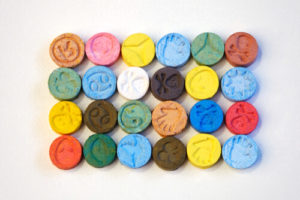About 6.8 percent of people say they have tried ecstasy at least once in their lives, according to the Drug Policy Alliance.
It is unknown how many people have experienced severe negative effects or overdose, but it is known that both can happen.
Knowing how to identify this overdose and what to do should it happen plays an integral role in getting someone help in time.
Identifying an Ecstasy Overdose
There is debate among experts about whether a person can experience a true overdose on ecstasy. Research is limited on this topic. However, there have been cases where someone has experienced the following as a result of taking high doses of this drug:
- Fainting
- Loss of consciousness
- High blood pressure
- Panic attacks
- Seizures
The severe effects are more often seen in people who combine ecstasy with other drugs, such as marijuana and alcohol. During acute marijuana intoxication, someone may experience mild perceptual distortion, hallucinations, and delusions, according to research published in the Journal of Psychopharmacology. This same research observed the potential for anxiety, depression, and psychotic episodes with ecstasy use. This could result in more extreme psychological effects when the two drugs are combined.
Ecstasy primarily acts on serotonin in the brain. Alcohol primarily works on gamma-Aminobutyric acid (GABA) in the brain. Both of these are neurotransmitters.
When alcohol and ecstasy are used together, especially in large amounts, dopamine levels increase. This is another neurotransmitter. The following effects are possible when these two drugs are combined, according to research published in Addiction Biology:
- Extreme dehydration that has the potential to lead to kidney damage and failure
- Severe anxiety
- Permanent or long-lasting brain damage affecting thinking, judgment, and memory
- Significant sleeping troubles
- Paranoia
- Rapid body temperature increase, which can lead to kidney, liver or cardiovascular failure, or in the most extreme cases, death
Dangers of an Ecstasy Overdose
There are no hard and fast statistics maintained regarding ecstasy overdose or death rates. However, it is estimated that about 50 people die every year in the United States as a direct result of ecstasy use, according to the Health Technology Assessment.
Several other effects occur as a result of consuming too much ecstasy. The most common include hyperthermia, serotonin syndrome, brain swelling, dehydration, and hyponatremia. Hyponatremia and hyperthermia are the most common of all of these effects.
Hyperthermia is not uncommon among people who use ecstasy.

Research shows that ecstasy interferes with the body’s ability to regulate temperature, causing the temperature to reach dangerous levels in warm environments, according to information published in the Journal of Neuroscience.
This is a medical emergency that requires immediate treatment.
Serotonin syndrome is not uncommon with high doses of ecstasy, and there have been numerous case reports, per research published in the American Journal of Therapeutics. This is because this drug causes a huge release of serotonin. In the most severe cases, this syndrome can cause seizures, unconsciousness, high fever, and an irregular heartbeat. This condition can lead to death if it is left untreated.
Brain swelling is a possible consequence of consuming too much MDMA. This problem is typically associated with hyperthermia. When the brain starts to swell, it has the potential to be fatal. It also can occur as a result of ecstasy-induced hyponatremia, especially in women, according to research published in Nephrology Dialysis Transplantation.
Dehydration can occur since ecstasy often makes people want to dance. They often do not think about how active they are being and may not consume enough fluids to compensate.
Hyponatremia may occur due to a combination of excessive sweating, increased water intake, and physical exertion when on ecstasy. This issue is characterized by low sodium levels. The most serious complications include coma and death due to rapid brain swelling.
It is also possible to experience adverse cardiovascular effects when taking too much ecstasy. These effects are largely due to the stimulant properties of this drug. People may experience cardiovascular collapse and cardiac dysrhythmias, according to Medscape.
What Can Lead to Overdose
Since the formulation of ecstasy varies so immensely, no strict amount leads to overdose. It often depends on the purity of the drug and other substances that are mixed with MDMA.
In many cases, people use the term “ecstasy poisoning” instead of overdose. Poisoning and overdose are possible when someone takes more than 1 mg to 2 mg (milligrams) per kg of body weight since this is considered to be an effective dose. However, it is also possible to overdose on the effective dose, especially when the MDMA is combined with other substances.
Taking ecstasy even once can lead to overdose or poisoning. This is due to this drug having no regulation. There is no telling what someone is actually taking when they use ecstasy.
Helping Someone in Immediate Need
During an overdose, the substance that someone took essentially overwhelms their body. The body can’t process or handle it.
Should you notice someone experiencing an ecstasy overdose, immediately call 911. While you are waiting for medical attention, you should also do the following according to the Pennsylvania Department of Drug and Alcohol Programs:
- Stay with the person and do not leave them alone.
- Turn the person on their side to reduce the risk of them vomiting and then inhaling some of it back into their lungs.
- Perform rescue breathing if they are not breathing.
If the person is seizing, turn them on their side and keep them safe. Move stuff out of the way and make sure they do not hit their head on something.

When you call 911, provide the dispatcher with as much information as possible. Tell them which substances the person used and when they used them. Also, tell the dispatcher as much information about the person and their health as possible, and any other pertinent information that could help the person experiencing an overdose.
When the paramedics arrive, give them room to work but let them know about any actions you took so they can document them. This is especially important if you have to administer rescue breathing.

